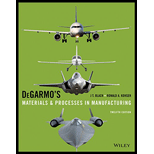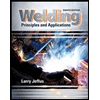
DeGarmo's Materials and Processes in Manufacturing
12th Edition
ISBN: 9781118987674
Author: J. T. Black, Ronald A. Kohser
Publisher: WILEY
expand_more
expand_more
format_list_bulleted
Concept explainers
Question
Chapter 19, Problem 29RQ
To determine
The operation of bar folder.
Expert Solution & Answer
Want to see the full answer?
Check out a sample textbook solution
Students have asked these similar questions
Homework#5
If the 50 mm diameter shaft is made from brittle material having an ultimate strength
of σult=595 MPa for both tension and compression, determine the factor of
safety of the shaft against rupture.
The applied force, F, is 140 kN.
The applied torque T, is 5.0 kN⚫m.
Enter your answer to a precision of two decimal places.
T
F
Oxygen (molar mass 32 kg/kmol) expands reversibly in a cylinder behind a piston at a constant pressure of 3 bar. The volume initially is 0.01 m3 and finally is 0.03 m3; the initial temperature is 17°C. Calculate the work input and the heat supplied during the expansion. Assume oxygen to be an ideal gas and take cp = 0.917 kJ/kg K. For 1 bonus mark explain why (using your understanding of thermodynamics) that oxygen is used in this context rather than water vapour.
Chapter 19 Solutions
DeGarmo's Materials and Processes in Manufacturing
Ch. 19 - What distinguishes sheet forming from bulk...Ch. 19 - What is a definition of shearing?Ch. 19 - Prob. 3RQCh. 19 - What measures can be employed to improve the...Ch. 19 - How does fineblanking create shearing in a...Ch. 19 - Prob. 6RQCh. 19 - What types of cuts are made by squaring shears?Ch. 19 - Why might a long shearing cut be made in a...Ch. 19 - What is a slitting operation?Ch. 19 - What is the difference between piercing and...
Ch. 19 - Prob. 11RQCh. 19 - Prob. 12RQCh. 19 - Prob. 13RQCh. 19 - Prob. 14RQCh. 19 - Prob. 15RQCh. 19 - Prob. 16RQCh. 19 - What is the benefit of making dies as a multipiece...Ch. 19 - Prob. 18RQCh. 19 - Prob. 19RQCh. 19 - Prob. 20RQCh. 19 - Prob. 21RQCh. 19 - Prob. 22RQCh. 19 - When making bends in sheet metal, what is the...Ch. 19 - Prob. 24RQCh. 19 - Prob. 25RQCh. 19 - Why does a metal usually become thinner in the...Ch. 19 - Prob. 27RQCh. 19 - Prob. 28RQCh. 19 - Prob. 29RQCh. 19 - What types of operations can be performed on a...Ch. 19 - Prob. 31RQCh. 19 - Prob. 32RQCh. 19 - Prob. 33RQCh. 19 - Prob. 34RQCh. 19 - What is the primary benefit of incorporating a...Ch. 19 - Prob. 36RQCh. 19 - What is the benefit of using a urethane (rubber)...Ch. 19 - What is the objective of the roll bending process?Ch. 19 - What is the role of the form block in draw bending...Ch. 19 - Prob. 40RQCh. 19 - Prob. 41RQCh. 19 - Prob. 42RQCh. 19 - Prob. 43RQCh. 19 - Prob. 44RQCh. 19 - Prob. 45RQCh. 19 - Prob. 46RQCh. 19 - Prob. 47RQCh. 19 - Prob. 48RQCh. 19 - Prob. 49RQCh. 19 - Prob. 50RQCh. 19 - Prob. 51RQCh. 19 - Prob. 52RQCh. 19 - Prob. 53RQCh. 19 - What is the distinction between shallow drawing...Ch. 19 - What is the function of the pressure ring or...Ch. 19 - Prob. 56RQCh. 19 - Prob. 57RQCh. 19 - Prob. 58RQCh. 19 - Prob. 59RQCh. 19 - Prob. 60RQCh. 19 - Prob. 61RQCh. 19 - Prob. 62RQCh. 19 - Prob. 63RQCh. 19 - Prob. 64RQCh. 19 - Prob. 65RQCh. 19 - Prob. 66RQCh. 19 - Prob. 67RQCh. 19 - Prob. 68RQCh. 19 - Prob. 69RQCh. 19 - Prob. 70RQCh. 19 - Prob. 71RQCh. 19 - Prob. 72RQCh. 19 - Prob. 73RQCh. 19 - Prob. 74RQCh. 19 - Prob. 75RQCh. 19 - What are some of the basic methods that have been...Ch. 19 - Prob. 77RQCh. 19 - Prob. 78RQCh. 19 - Prob. 79RQCh. 19 - Prob. 80RQCh. 19 - Prob. 81RQCh. 19 - What properties from a uniaxial tensile test can...Ch. 19 - How is the formability in biaxial tension...Ch. 19 - What is normal anisotropy, R and planar...Ch. 19 - Prob. 85RQCh. 19 - Prob. 86RQCh. 19 - Prob. 87RQCh. 19 - Prob. 88RQCh. 19 - What two hot�forming operations can be used to...Ch. 19 - Prob. 90RQCh. 19 - What are the primary assets and limitations of...Ch. 19 - Prob. 92RQCh. 19 - Prob. 93RQCh. 19 - What are some of the attractive features of...Ch. 19 - What are some of the common types of press frames?Ch. 19 - What are some features that may be included into a...Ch. 19 - Prob. 97RQCh. 19 - Prob. 98RQCh. 19 - Prob. 99RQCh. 19 - Prob. 100RQCh. 19 - The maximum punch force in blanking can be...Ch. 19 - Prob. 2PCh. 19 - Prob. 3PCh. 19 - What are some of the techniques for minimizing the...Ch. 19 - Prob. 5PCh. 19 - Prob. 6PCh. 19 - Prob. 1CSCh. 19 - Prob. 2CSCh. 19 - Prob. 3CSCh. 19 - Polymeric materials have characteristically low...Ch. 19 - If adhesive bonding is specified as a replacement...Ch. 19 - Which of the material/process options do you feel...Ch. 19 - Prob. 7CSCh. 19 - Prob. 8CS
Knowledge Booster
Learn more about
Need a deep-dive on the concept behind this application? Look no further. Learn more about this topic, mechanical-engineering and related others by exploring similar questions and additional content below.Similar questions
- Hydrodynamic Lubrication Theory Q1: Convert this equations into Python by 1- ah ap a h³ ap 1..ah = ax 12μ ax ay 12μ ay 2 ax Where P=P(x, y) is the oil film pressure. 2- 3μU (L² ε sin P= C²R (1+ cos 0)³ Q2: prove that |h(0) = C(1+ cos 0) ?arrow_forward### To make a conclusion for a report of an experiment on rockets, in which the openrocket software was used for the construction and modeling of two rockets: one one-stage and one two-stage. First rocket (single-stage) reached a maximum vertical speed of 200 m/s and a maximum height of 1000 m The second rocket (two-stage) reached a maximum vertical speed of 250 m/s and a maximum height of 1800 m To make a simplified conclusion, taking into account the efficiency of the software in the study of rocketsarrow_forwardWhat is the difference between saturated liquid and compressed liquid? What is the difference between the critical point and the triple pointarrow_forward
- What is quality? Does it have any meaning in the superheated vapour region? What is the difference between saturated vapor and superheated vapour? What is the difference between saturated liquid and compressed liquid? What is the difference between the critical point and the triple point?arrow_forwardHomework#5arrow_forwardDescribe the principle operation of PEMFC, and role of membrane electrode assembly (MEA).arrow_forward
- Homework#5arrow_forwardUsing graphical methods, draw the pressure angle at the position shown in (a) and (b). e |------- R = Cam Base Radius e = Follower Offset ẞ₁ = Section Duration 1 B₁ = Section Duration 2 ẞ₂ = Section Duration 3 В2 B₁ Follower Position ww R ẞ3 (a) Reference Radial (b)arrow_forwardThe figure below illustrates a graph that has a variable load torque and constant drive torque. Each cycle lasts three revolutions (6л radians). Torque (N-m) 600 550 400 1 200 TD= 225 N-m 2 + -T₁ 3 4 1 + 0 In addition, the rotation speed is @o steady-state conditions, determine 1. the average power required, 2πT 4π 5πT 6п Ꮎ = 180° rpm = 18.85 rad/sec, Imachine 125 kg-m². Assuming 2. the maximum and minimum rotational speeds throughout a cycle, 3. the mass of a 0.6-meter-diameter solid disc flywheel to produce Cs = 0.025.arrow_forward
- An elastic cord is stretched between 2 points A and B located 2y = 0.8 m apart in the horizontal plane. When stretched directly between A and B, the tension is P₂ = 40 N. The cord is then stretched as shown until its midpoint C has moved through x = 0.3 m to C', and a force of F = 240 N is required to hold the cord at C'. A pellet (m = 0.1 kg) is placed at C' and the cord is released. Find the speed of the pellet as it passes through C.arrow_forwardA 6305 ball bearing is subjected to a steady 5000-N radial load and a 2000-N thrust load and uses a very clean lubricant throughout its life. If the inner race angular velocity is 500rpm find (a) The equivalent radial load (b) The L10 life (c) The L50 lifearrow_forwardSlove this the question plearrow_forward
arrow_back_ios
SEE MORE QUESTIONS
arrow_forward_ios
Recommended textbooks for you
 Welding: Principles and Applications (MindTap Cou...Mechanical EngineeringISBN:9781305494695Author:Larry JeffusPublisher:Cengage Learning
Welding: Principles and Applications (MindTap Cou...Mechanical EngineeringISBN:9781305494695Author:Larry JeffusPublisher:Cengage Learning Refrigeration and Air Conditioning Technology (Mi...Mechanical EngineeringISBN:9781305578296Author:John Tomczyk, Eugene Silberstein, Bill Whitman, Bill JohnsonPublisher:Cengage Learning
Refrigeration and Air Conditioning Technology (Mi...Mechanical EngineeringISBN:9781305578296Author:John Tomczyk, Eugene Silberstein, Bill Whitman, Bill JohnsonPublisher:Cengage Learning

Welding: Principles and Applications (MindTap Cou...
Mechanical Engineering
ISBN:9781305494695
Author:Larry Jeffus
Publisher:Cengage Learning

Refrigeration and Air Conditioning Technology (Mi...
Mechanical Engineering
ISBN:9781305578296
Author:John Tomczyk, Eugene Silberstein, Bill Whitman, Bill Johnson
Publisher:Cengage Learning
Principles of Lubrication | Automobile Engineering; Author: Magic Marks;https://www.youtube.com/watch?v=MGbbSxZTdCQ;License: Standard Youtube License